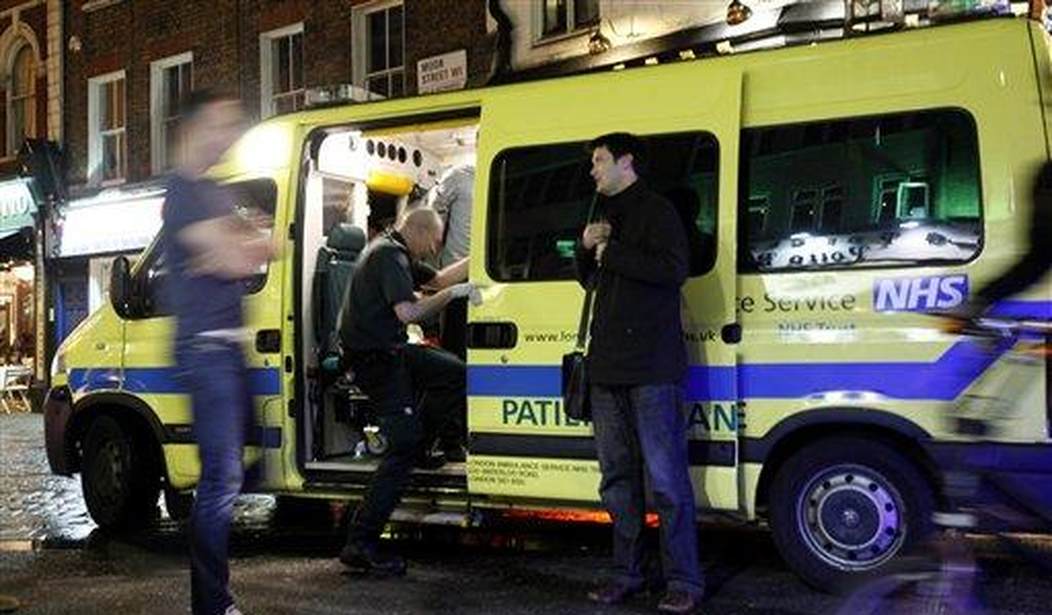The BBC published a story today about one families tragic experience with the NHS ambulance service. Back in November a 68-year-old man named Martin Clark began having chest pains. His wife dialed 999 which is the British equivalent of 911 and asked for an ambulance. Thirty-two minutes later no ambulance had arrived and she called 999 again to inform them her husband was getting worse. Finally, after another 15 minutes passed, the family called a third time to inform the dispatcher that they would drive Mr. Clark to the hospital themselves. They were told that was not recommended but did it anyway.
When they arrived, the father-of-five went into cardiac arrest and, despite receiving medical attention, died.
His wife, Ann, said while waiting for an ambulance he had been crying out in pain and at one point wrote a note saying: “I don’t think I’m going to make it. Love you.”
It was excruciating, she said, adding: “He was let down very badly. They should have come.”
When Ann eventually returned home she found a message had been left on her home phone. About 10 minutes after she’d left the house they’d called to say they still hadn’t found an ambulance. The ambulance service issued an apology:
The South East Ambulance Service said: “We are very sorry we were unable to provide a timely response to Mr Clark. Our thoughts are with his family and we will look into this.
What makes this especially newsworthy is that it’s not that unusual. The wait time for an ambulance has been in the range of 45-60 minutes for the past year or more. That’s not for all calls but for so-called category 2 calls like the one from Ann Clark. Category 2 calls include emergencies like “stroke or chest pain.” And the situation got significantly worse in December when the average response time shot up to more than 90 minutes.
Monthly ambulance data shows that 999 callers classed as category two — which includes heart attacks, strokes, burns and epilepsy — waited 1 hour, 32 minutes and 54 seconds, on average, for paramedics to arrive.
This is five-times longer than the NHS’s 18-minute target.
It is also the longest response time since records began in 2017 by more than 30 minutes.
The previous record was 1 hour, 1 minute and 19 seconds, recorded in October.
And 10 per cent of category two callers had to wait at least 3 hours, 41 minutes and 48 seconds for medics to arrive.
Of course the ambulance only gets you to the A&E (Accident & Emergency, the British equivalent of the ER). But once there many patients will face waits that stretch into hours.
A&Es were also battered last month. Nearly 1,800 patients attending casualty had to wait at least 12 hours to be treated each day in December. Only two-thirds were seen within four hours — the worst performance logged in records going back more than a decade.
Compounding all of this is the fact that ambulance services went on strike in December. That strike ended but more strikes by paramedics were launched yesterday. To be fair, the paramedics themselves sound pretty traumatized by what is going on right now. This story involves a patient who was thought to be in a lower category. She’d fallen and couldn’t get up. But it turned out she’d had a stroke.
Lizzie Archer, who has been a paramedic for 12 years, told me she is on the picket line in Bristol today because she was frustrated about not being able to do her job..
Lizzie explained there was a recent emergency call which had stayed with her, where a woman was waiting on the floor for 16 hours because she couldn’t get an ambulance.
She adds that when they were able to help, it was “evident she had had a stroke” and the amount of time the woman was waiting “leaves you out of the window for treatment”.
“On arriving at hospital she was then kept on the back of our ambulance for another nine hours, where we had to sit and to watch her deteriorate. I’m not a stroke specialist, I’m not a doctor, that’s not my job. She should have been in a bed, in a hospital with a specialist team and she wasn’t.”
Another paramedic told the BBC, “I went to a call the other day that was 36 hours old.” So emergency calls aren’t being responded to quickly enough to save lives and non-emergency calls which could still be serious are not responded to at all.








Join the conversation as a VIP Member